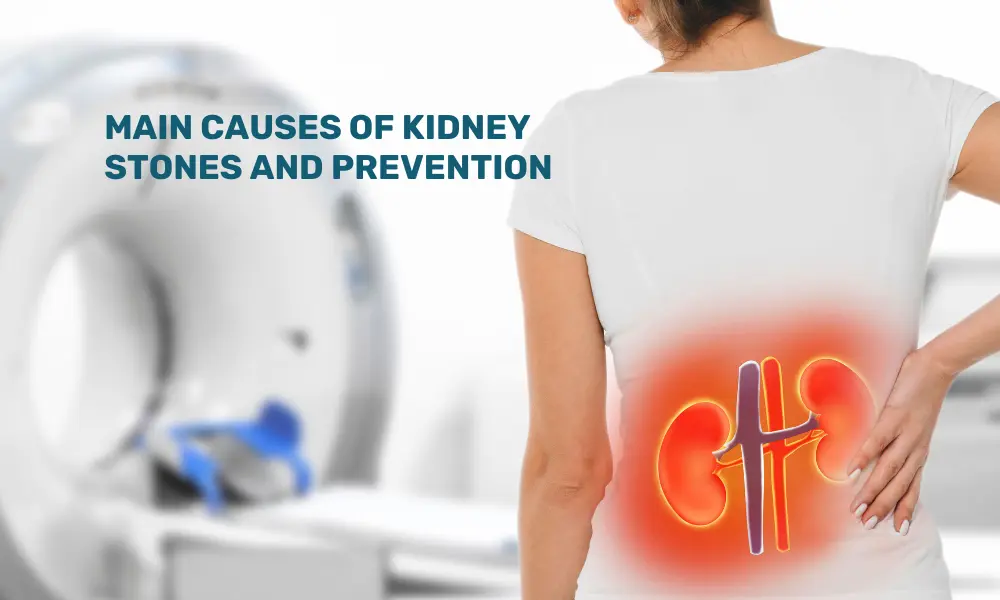Kidney stones are relatively common, affecting individuals of all ages and genders. Kidney stones are the formation of hard mineral deposits that produce both pain and discomfort. Let’s take a closer look at the main causes of kidney stones, and early signs that you might have them.
Kidney Stones
Kidney stones are a hard mass formed in the kidneys, typically consisting of insoluble calcium compounds. The size of kidney stones varies, ranging from grain-like to the size of a golf ball. While in some cases, kidney stones can cause pain, in most cases, they can remain asymptomatic, sometimes for years.
Main Causes of Kidney Stones
Several factors contribute to the development of kidney stones. Genetics, poor dietary choices, and certain lifestyle conditions make people more prone to developing these stones. The main reasons for kidney stone development include the following factors:
Diet High in Salt, Sugar, or Protein: People who consume excessive amounts of salt, combined with sugar and animal protein, face an elevated risk of developing kidney stones. High salt intake causes your kidneys to produce more calcium, which ends up in your urine, where stones can form. Foods containing high fructose levels, along with sugar products, increase your susceptibility to developing kidney stones. The consumption of red meat, poultry, and eggs can elevate uric acid levels in the body, which can result in stone formation.
Obesity: Obesity and being overweight create urine acid changes that help stones develop more easily. Research demonstrates that weight gain produces an increased risk for individuals to develop kidney stones.
Not Drinking Enough Water: Water deficiency is one of the main reasons behind the development of kidney stones. When water consumption remains low, the concentration of urine increases. When minerals and salts are exposed to higher concentrations, they tend to clump together into stone formations.
Family History and Genetics: The likelihood of developing kidney stones increases when a family member has experienced them before. Certain inherited conditions lead people to develop stone-forming conditions, including cystinuria, which results in the excessive release of certain amino acids that can later form stones.
Some Medications and Supplements
The use of diuretics along with calcium-based antacids and certain antibiotics increases the risk of developing this condition. Stone development can be caused by taking excessive amounts of vitamin D or calcium, and other specific supplements.
Certain Medical Conditions
Health problems of various kinds raise the chances of developing kidney stones in patients. These include:
-
Chronic diarrhea, which can cause dehydration
-
Gout, which raises uric acid levels
-
Several medical conditions lead to the development of kidney stones, including Crohn’s disease and inflammatory bowel disease (IBD), among others.
Early Signs That May Indicate Small Kidney Stones
Small kidney stones may not cause any symptoms, but their presence remains a possibility. The first few signs that indicate a kidney stone include
Pain in the Side, or Lower Back: The first indication of a kidney stone manifests as dull pain or severe sharp pain, located in your side or lower back region near the rib area. The discomfort will either intensify or decrease in severity, while remaining gentle during its initial phases. The pain becomes more intense when the stone begins to move locations.
Changes in Urine: Another early symptom of developing kidney stones presents through various urine-related changes, which include:
Cloudy or foul-smelling urine: Pink, red, or brown urine (a sign of blood). Frequent urge to urinate, even if a small amount. This occurs because the stone alters the lining of your urinary tract, leading to irritation as a result.
Nausea or Vomiting: When small kidney stones exist, they can cause stomach discomfort, which leads to vomiting. The stone’s pain signals your digestive system to react, leading to this outcome. When you experience nausea without any apparent reason, while experiencing back pain or changes in your urine, it may indicate a kidney stone.
How to Lower Your Risk
Simple lifestyle modifications will decrease your chances of developing kidney stones. These include
-
Drink plenty of water every day
-
Eat less salt and animal protein
-
Maintain a healthy weight
-
Avoid sugary drinks and foods
-
Consult with your doctor prior to taking supplements
Disclaimer: This article is meant for informational purposes only and must not be considered a substitute for professional advice.





